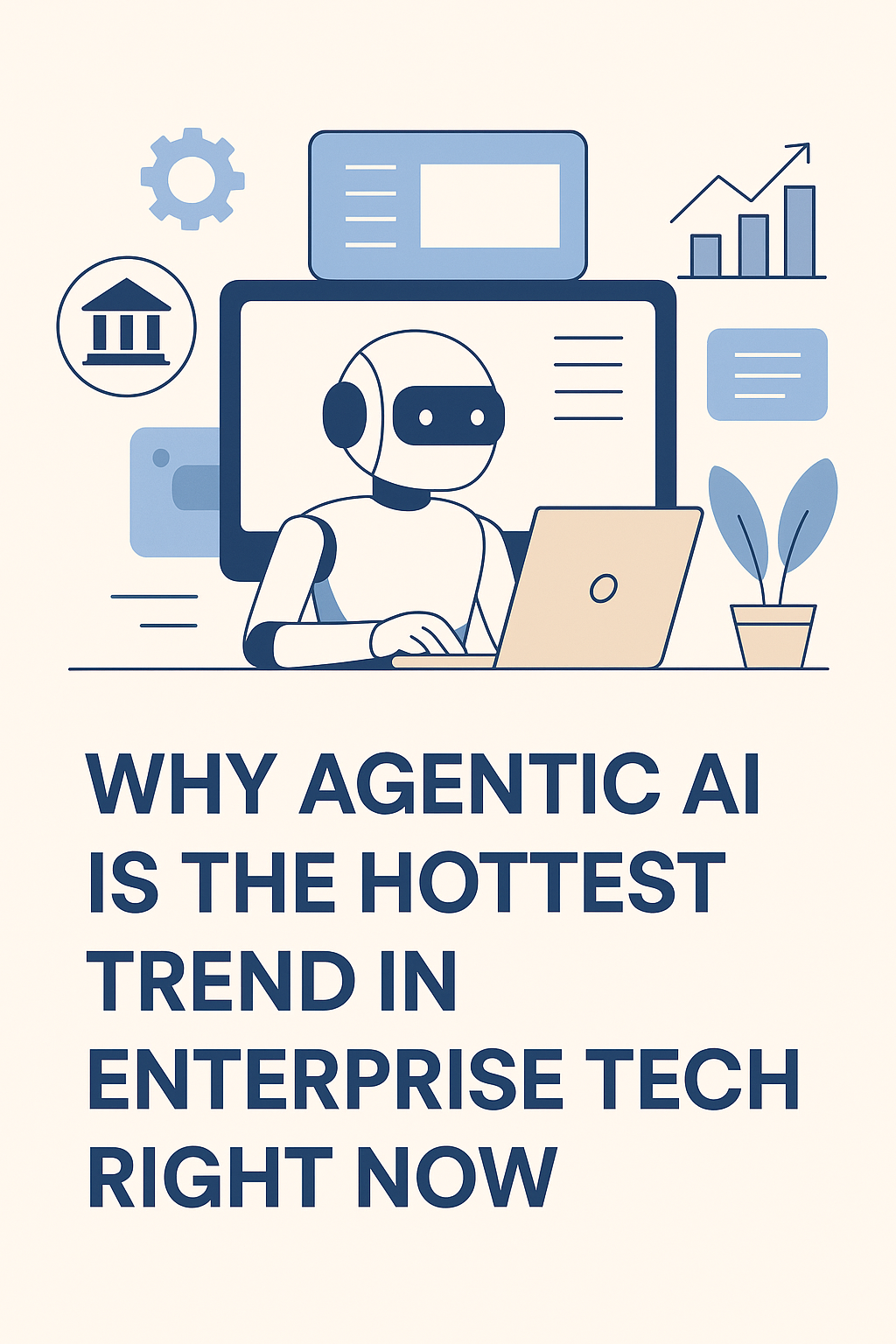
Why Agentic AI Is the Hottest Trend in Enterprise Tech Right Now
🌐 What Is Agentic AI?
Agentic AI refers to artificial intelligence systems that are capable of independent reasoning and action. These systems don’t just wait for user prompts—they act proactively, execute multi-step workflows, make decisions, and continuously learn and improve.
Imagine an AI that doesn’t just answer questions, but actively schedules your meetings, creates reports, responds to emails, and even predicts what tasks you’ll need help with tomorrow. That’s the promise of agentic AI: AI with autonomy.
Unlike older forms of AI that are reactive and task-limited, agentic AI systems are built on large language models (LLMs) and agent frameworks (like AutoGPT, ReAct, and LangChain), which give them the ability to:
-
Set and pursue goals
-
Chain multiple tasks intelligently
-
Interact with tools, APIs, or databases
-
Monitor their environment and adjust behavior
These systems are not just tools—they’re digital workers.
📈 Why Agentic AI Is Trending in 2025
As businesses evolve, so do their needs. In a fast-paced digital world, companies are facing growing pressure to:
-
Reduce operational costs
-
Scale processes without hiring more staff
-
Improve response times
-
Enhance data-driven decision-making
-
Maintain competitive edge in tech adoption
Agentic AI checks all these boxes—and more. In 2025, it’s becoming an enterprise essential because:
-
🔄 Always-On Productivity: AI agents work 24/7 without breaks, delivering consistent performance.
-
🤖 Human-Like Initiative: They don’t wait for instructions; they act, learn, and optimize on their own.
-
💼 Business Scalability: Enterprises deploy thousands of agents to run customer support, internal workflows, and more.
-
🧠 Improved Decision-Making: With access to real-time data and analytics, agents make faster, smarter business decisions.
💼 Enterprise Use Cases for Agentic AI
Here are some real-world applications showing how agentic AI is transforming business operations in 2025:
1. Customer Support
Companies now use agentic AI for first-line support, ticket triaging, and customer follow-ups. Agents respond to emails, chat messages, and even phone calls—resolving issues or escalating them based on priority.
Example:
A telecom company uses agentic AI to handle 80% of its Tier 1 support tickets, saving hundreds of hours weekly.
2. HR and Talent Acquisition
AI agents screen resumes, schedule interviews, send onboarding emails, and guide new employees through training modules.
Example:
A SaaS startup has reduced HR workload by 60% using AI agents for candidate management and onboarding.
3. Finance and Reporting
Financial firms are deploying agentic AI to analyze spreadsheets, detect anomalies, prepare tax documents, and manage budget reports—entirely autonomously.
Example:
A fintech firm uses agents to produce weekly reports and insights for executive teams, saving 12 hours per manager.
4. Project Management
AI agents now handle task assignments, follow-ups, reminders, and even team coordination based on priority, availability, and deadlines.
Example:
A marketing agency has integrated agentic AI into its Trello and Slack channels to keep teams aligned without human micromanagement.
5. Sales & CRM Automation
Agents update records, identify hot leads, send follow-up emails, and generate performance dashboards for sales managers.
Example:
A B2B software company has increased conversion rates by 18% by deploying AI agents in its CRM tools.
🔬 The Tech Behind Agentic AI
So how does this work behind the scenes?
Agentic AI relies on a combination of technologies:
-
Large Language Models (LLMs): GPT-4o, Claude 3, Gemini, and Mistral handle understanding and language generation.
-
Agent Frameworks: Tools like LangChain, AutoGPT, BabyAGI, and CrewAI power decision-making and tool usage.
-
APIs & Plugins: Agents interact with your apps (like Google Calendar, Notion, Slack, Trello, Zapier, and CRMs) to carry out actions.
-
Memory & Planning: They retain context over time, improving task consistency and output quality.
These elements combine to create self-directing agents that behave like junior employees—learning and evolving with experience.
⚠️ Challenges & Limitations
While agentic AI is promising, it’s not without challenges:
-
🛑 Security Risks: Agents that act on your data need strong permissions management.
-
🌀 Hallucinations: LLMs still generate incorrect information occasionally.
-
🧩 Complex Setup: Integrating multiple tools and APIs can be technical.
-
🤔 Accountability: Who’s responsible if an AI agent makes a bad call?
Enterprise adoption requires careful oversight, human fallback systems, and ongoing monitoring.
🚀 Future Outlook: The Rise of the Digital Workforce
By 2026, Gartner predicts that 30% of enterprise tasks will be handled by AI agents. That means fewer repetitive tasks for humans and more time for creativity, strategy, and growth.
Agentic AI isn’t about replacing people—it’s about augmenting them. You’ll still need humans for emotional intelligence, leadership, and innovation—but AI will handle the grunt work.
We’re entering an era where “Who is on your team?” might include both employees and a dozen specialized AI agents. AganticAI
🧠 Should You Use Agentic AI in Your Business?
Yes—if you’re ready to streamline workflows, scale smartly, and embrace innovation. Whether you’re a startup founder, enterprise leader, or solo operator, you can start with agent tools like:
-
🔹 OpenAI GPTs
-
🔹 ReAct agent chains
-
🔹 CrewAI for collaborative agents
-
🔹 Zapier AI agents
-
🔹 Custom internal copilots
Even small teams can deploy one or two agents to automate scheduling, customer outreach, or data entry—no coding required.
🧾 Conclusion: The Future Belongs to the Proactive
Agentic AI is not a trend—it’s a shift. The transition from prompt-driven tools to goal-driven digital workers represents a new phase of enterprise evolution.
Businesses that adopt early will benefit from lower costs, faster decision-making, and a smarter, automated workflow.
As AI agents become more capable, the only question left is:
How many AI coworkers will you have next year?
 What Is Agentic AI?
What Is Agentic AI?